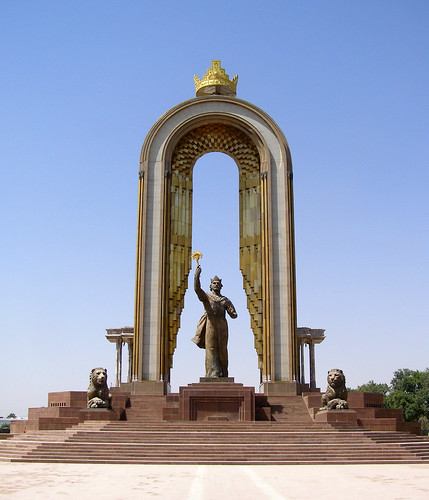Monday, July 19, 2010
Back in the USSR
On nearly opposite sides of the former Soviet Union, Latvia and Tajikistan have many differences, but I couldn't help being struck by the similarities: the same trams (green in Dushanbe, blue in Riga), the same pedestrian underpasses with flower sellers, even fruit markets that sold large quantities of dill. The first two were clearly the Soviet legacy, though the culinary tastes probably go back even further, and may be inexplicable.
Both cities are full of outdoor cafes selling shashliks, beer and fanta (btw, Tajik Fanta is bottled in Afghanistan). There are parks with fountains that light up at night, streets full of scandoulously dressed young women and grandmothers wrapped in long dresses and head scarves. But while Latvia seems to be facing west, ever closer into the embrace of the EU, Tajikistan seems to be doing all it can to reclaim its heritage as part of the Persian world. In Riga, the Soviet period has been lumped together with the German conquest during World War II in a single "Museum of the Occupation." The icon that loomed large over the port city was the Christmas tree ( Latvia's laying claim to having invented it). At this time of year, one large specimen was decked out in sunflowers in recognition of Midsummer's Day.
In Dushanbe, where statues of Stalin and Lenin used to stand, there are now Rudaki, Aini, Ferdowsi - the heroes of Persian literature. The rather terrible monument (see above) that dominates Rudaki avenue is celebrating Ismoil Somani, the greatest king of the Samanids, a dynasty that sprung from central Asia. Its outrageous gold looked rather beautiful in the setting sun today, and even the presidential palace (whose furniture alone cost millions; Tajikistan is one of the poorest countries in Asia) was softened a little by the orange light. Its clear that in both new countries, there is a need to rewrite history, to find a new identity and pride in being independent nations.
All of these grand gestures seem a bit out of place in a hot and crumbling city like Dushanbe, and, aesthetic crimes aside, certainly seem less important that improving, say, health and education. Still, there is something surprisingly friendly and open about Dushanbe. Compared to the cities I visited in India, it is quite clean and quiet, with tree lined streets and rose gardens. In the cooler evenings couples stroll and children rollarblade along Rudaki Avenue. For me, some of the openness comes from the wonderful, and somewhat surprising, fact that I can understand people. That may be the best thing I learned from being in Latvia - having spent some time knowing two words of latvian (lidosta = airport, iela = street) - my halting, formal, Iranian-accented Tajik is serving me quite well here. Most people can't quite figure us out: we are clearly foreigners, yet we speak no Russian. Then we attempt to speak Tajik and the confusion grows, though mostly people are pleasantly surprised.
I've benefited from the amazing generosity of near strangers as I struggled my way through the last few days. After I arrived in Riga with no money (don't ask, someone got a few hundred dollars richer off my stupidity), having almost been arrested by the Latvian traffic police, Ieva took wonderful care of me. She brought me tram tickets, cooked me dinner, took me to the beach, and figured out how to send a fax to America. She is either the best advertisement for couch surfing, or perhaps just the savior of my faith in humanity. (Thank you! I hope the karma comes back to you soon). And here in Dushanbe, the Rakhmatov family have opened their house to Mari and me. Every one should be lucky enough to have a Bibijon to cook them a full breakfast after their plane arrives at 5 AM.
This week I'll be beginning my interviews for my research project, starting with NGO staff in Dushanbe. Then it will be off to the southern plains, and the home village of President Rahmon. It was 99 here today. It gets even hotter there. Wish me luck.
Subscribe to:
Post Comments (Atom)

No comments:
Post a Comment